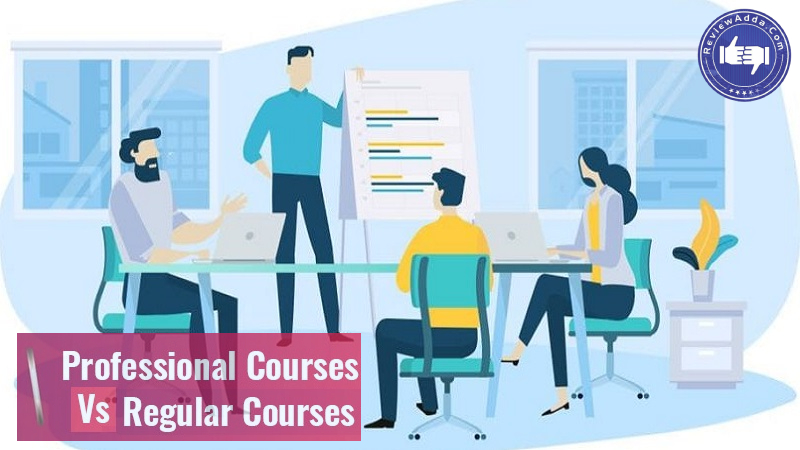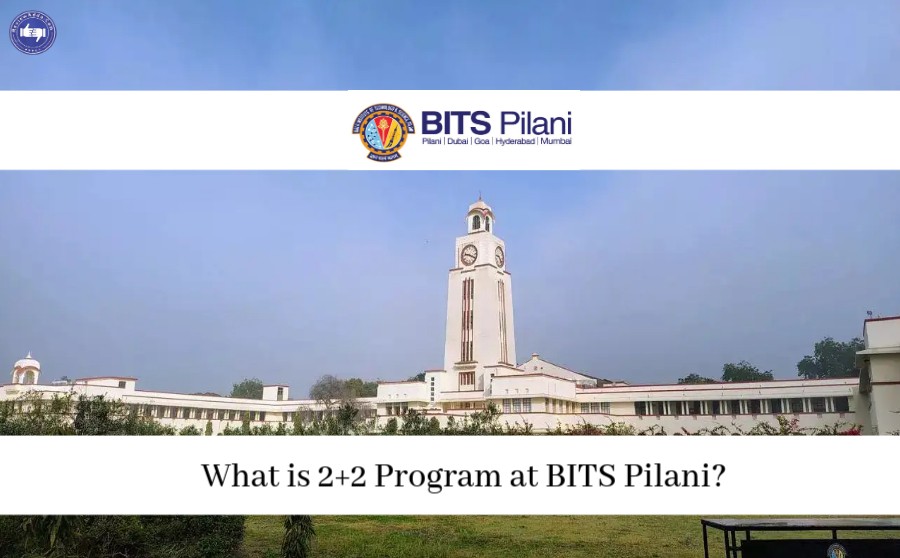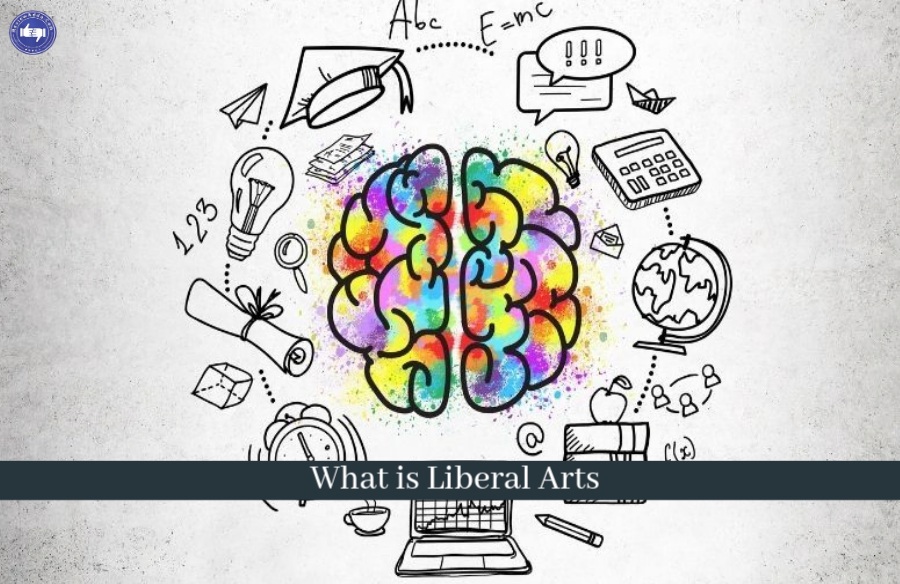What is the Difference Between Regular Courses and Professional Courses? || Highlights |
||
| S.No. | Facts | Status |
| 1. | Regular Courses | Click |
| 2. | Traditional bachelor degree widens your scope and knowledge | Click |
| 3. | Benefits of a Regular Courses | Click |
| 4. | Disadvantages of a Regular Course | Click |
| 5. | Major Regular Degrees List and Abbreviations | Click |
| 6. | Professional Courses | Click |
| 7. | Professional degree gives your career a quick start | Click |
| 8. | Benefits of a Professional Degree | Click |
| 9. | Disadvantages of a Professional Degree | Click |
| 10. | List of Professional Courses in India | Click |
| 11. | List of Professional Degree Courses in India | Click |
| 12. | Career Scope of both professional and regular courses in India | Click |
| 13. | Which One Should You choose for – Regular course or Professional course? | Click |
The time of choosing an appropriate career path for oneself is the most crucial phase of a student’s life as it serves as the position of one's future life. The choice of a career defined the life of a student. A one and only decision of selecting a career path is enough to make or ruin the life of a student. A student should go on the conclusion of Choosing the Right Career Path for himself/herself with proper care.

After a proper analysis one should take the career decision of available career options, a complete understanding of one's own passions and interests, akin to types of courses which match the interests of the student, and the Future Scope and Prospects of the selected field. If a student takes the decision of selecting their career field in a rush and without doing any proper analysis, then they may end up taking a wrong career path.
Making a 'living' is not similar as 'making a life' because life is not just about earning money. It is about living every moment to its fullest. One should not destroy our dreams by choosing the wrong career path. For avoiding choosing the Wrong Career Path, a student must first look into their own self and try to discover their inner passions, desires, interests and hidden talents. Then after thoroughly understand and a complete analysis of one’s own self, student should finalize his career path accordingly.
While choosing one's career students often come across a stage of utmost confusion and end up taking a wrong career in a hurry. The one who take their decision in a hurry often go through severe health and mental issues like, frustration anxiety, tension, and depression. Wrong career decision makes their life monotonous and troublesome. So, out of frustration from life, they even acclimate nasty habits including addiction. Some even end up their life. This all happens just due to a wrong decision, hurry in decision making and negligence.
Students often fail to decide that whether they should go for a regular course or a Professional Course. To help the students in selecting the appropriate career for them, we will talk over in this article of the differences between regular courses and professional courses as this question puzzles a lot of students.
When you finished your X, you had a simple option of 3 streams, but now when you complete your XII, suddenly you will be faced with literally hundreds of options for courses. In such a situation, it’s natural to feel baffled, especially since certain degrees appear to reach the same career, but through different paths. The key process for this is to move step-by-step.
At the college level, the majority of degree courses can be identified as either Professional Degree Courses such as B.Tech or MBBS, or academic degree courses such as B.A, B.Sc., etc. Generally, academic degree courses held more value, but the popularity-wise professional courses in current times have firmly established their ground in the job market.
A Professional Course is one that provides you with practical skills, making you job-ready at the completion of the course. In contrast, the goal of a regular course is to provide you with a strong academic foundation in a particular subject, not necessarily making you ‘job-ready’.
Let’s discuss compare the Regular courses vs. Professional courses to help you figure out which works the best in your case.
Regular Courses
Regular courses are simple Graduation Courses. These courses are very popular and demanded courses of all times. Regular courses are available for students of every stream, including Commerce, Humanities, and Science. These are the simple B.Com, BA, and B.Sc courses which can be pursued generally by anyone. Students often gotoselect for these courses because they are considerably cheap. Moreover, students also select to pursue these courses because they find them convenient.
Students find these courses appropriate because they do not need long hours of study. They are commonly treated to be accessible courses which can be passed by any average student. That’s why students who would like to pursue a course just for the mere sake of Getting a Graduation Degree go for these courses.
But the career scope of these courses are limited and they do not offer any wide future prospects. Without any masters’ degree the value of these courses is considered to be very low. So, the students who pursue these courses are needed to go for masters’ in order to increase their market worth.
Traditional bachelor degree widens your scope and knowledge
- The traditional bachelor's degree requires the students to study a huge variety of topics which are beneficial not just in professional life but are also valuable in personal life. They facilitate a person to think from different angles.
- If a student passes out his graduation with a Regular Degree Course the scope for a student in PG courses is wider.
- People usually choose between regular and specialized courses with money as their yardstick. In a rush to initiate quick earning, they choose professional courses but that doesn’t mean it will give a good career. There exists a difference between quick earning and good earning.
- The selection of course should be on the basis of interest in a particular subject and not its earning potential.
- Rather than wanting to initiate earning right after graduation, the students should focus to specialize in that subject and take up some paid internships which will further raise their value in the market.
Benefits of a Regular Courses
Regular Courses or Academic Degrees, such as BA, B.Sc. and B.Com have been considered more ‘traditional’ and well-established forms of higher education and are available in a variety of specializations, such as B.A Economics, B.A English, B.A Hindi, B.Sc. Physics, B.Sc. Computer Science, B.Sc Applied Science, and the list goes on. An academic degree typically provides a thorough education and knowledge on the specific subject, after which the student can pursue a Master’s degree or a Professional Course.
1. Keeps More Career Options Open
One of the biggest advantages of pursuing a regular course is the availability of the level of flexibility, especially if you are not 100 % sure of the career path you want.
For example, if you are interested in English as a language, you can pursue that at the Bachelor’s level and move on to a Career-Oriented Course in teaching, media, designing, writing, etc. after your B.A course, you get three more years to decide on a career. If you are willing to pursue in Physics, studying Physics at a B.A level can aid you identify which specific area of the subject your interest lies.
2. Helps You Specialize
Studying the same field at a Bachelor’s and Master’s level (for example, B.A Psychology followed by M.A Psychology) will provide you with a more in-depth knowledge of the subject matter.
3. Merit-Based Admissions
Admissions are generally conducted on the basis of marks in XII, or on the basis of small-scale entrance tests. For example, if you like to become a software developer and have scored well in your XII marks but fared not as well in Engineering Entrance Tests, you can opt for B.Sc. Computer Science regular degree which will give you with a lot of the similar knowledge. To top it off, pursue a few certifications and you will be ready for a job.
4. A Few Courses need Academic Degrees
There are many jobs/professional courses which require the Min. Eligibility Criterion of Graduation, for example, LLB degree and Chartered Accountancy. Through academic degrees the eligibility criteria can be met in a similar field that would be effortless to study and helpful later on. In the case of law, B.A Political Science would be a good match, or a basic BA degree while B.Com or B.Sc. Mathematics would help in Chartered Accountancy.
5. Availability of Distance Education option
Academic degrees are also available in Distance Education and correspondence formats, so you can pursue an academic degree alongside a job or alongside any other course.
Disadvantages of a Regular Course
Apart from the benefits of a regular courses, there are certain disadvantages as well.
1. It Doesn’t Make You Job-Ready
On its own, a regular course is typically not enough to get a high-paying job or to launch a successful career in an established field. You would invariably have to add on either a short-term course, a Master’s degree, a Professional Course, or a certification to be able to have an established career.
2. Professional Training required for some fields
In many fields, a professional course is required and cannot be replaced by academic studies. For example, in medicine, it is mandatory to complete either MBBS or BAMS (Ayurveda) or BHMS (Homeopathy) to be able to practice medicine as a licensed doctor. While academic degrees are available in fields such as B.Sc. Allied Health Sciences and B.Sc. Hospital Administration, they are not similar to a completely experienced Medical Professional Degree. Similarly, to practice law, an LLB degree is a must.
3. Cut-Offs May Be High
Admission cut-offs in well-known, reputed universities such as Delhi University can reach sky-high, even beyond 95 % for some courses.
Major Regular Degrees List and Abbreviations
- Bachelor of Arts - B.A.
- Bachelor of Ayurvedic Med. & Surgery - B.A.M.S.
- Bachelor of Business Administration - B.B.A.
- Bachelor of Commerce - B.Com.
- Bachelor of Computer Applications - B.C.A.
- Bachelor of Design - B.Des. / B.D.
- Bachelor of Education - B.Ed.
- Bachelor of Fisheries Sc. - B.F.Sc./ B.Sc. (Fisheries).
- Bachelor of Homoeo. Med. and Surgery - B.H.M.S.
- Bachelor of Laws - L.L.B.
- Bachelor of Library Science - B.Lib. / B.Lib.Sc.
- Bachelor of Mass Communications - B.M.C. / B.M.M.
- Bachelor of Nursing
- Bachelor of Pharmacy - B.Pharm / B.Pharma.
- Bachelor of Physical Education - B.P.Ed.
- Bachelor of Physiotherapy - B.P.T.
- Bachelor of Science - B.Sc.
- Bachelor of Social Work - BSW / B.A. (SW)
- Bachelor of Vet. Sc. & Animal Husbandry - B.V.Sc. & A.H. / B.V.Sc
- Doctor of Medicine in Homoeopathy - M.D. (Homoeopathy)
- Doctor of Pharmacy - Pharm.D
- Doctor of Philosophy - Ph.D.
- Master of Arts - M.A.
- Master of Commerce - M.Com.
- Master of Computer Applications - M.C.A.
- Master of Design - M.Des./ M.Design.
- Master of Education - M.Ed.
- Master of Library Science - M.Lib./ M.Lib.Sc.
- Master of Mass Communications / Mass Media - M.M.C / M.M.M.
- Master of Pharmacy - M.Pharm
- Master of Philosophy - M.Phil.
- Master of Physical Education M.P.Ed. / M.P.E.
- Master of Physiotherapy - M.P.T.
- Master of Science - M.Sc.
- Master of Social Work / M.A. in Social Work - M.S.W. / M.A. (SW)
- Master of Sc. in Agri. - M.Sc. (Agriculture)
- Master of Veterinary Science - M.V.Sc.
Professional Courses
What Is a Professional Course?
Professional Courses are special courses, offered at several colleges and universities, which put importance on professional development. Unlike regular courses, these courses usually do not need conditions, sometimes do not offer credits and are particularly oriented toward professionals wanting to improve skills valuable for their specific work environment.
Professional courses are the courses which admit students to do specialization in a particular field. These courses are focused around their particular field. Now-a-days, Professional courses have become very popular and high-in-demand. This is because, with the briskly developing fast-paced world, one requires highly professional courses to become successful. Moreover, professional courses aim at developing the skills which a person requires in order to be able to work in a specific industry or a job.
To discover their hidden skills and talents professional courses help students. To achieve greater competence in their field and enhance their prospects for progress these courses make students highly efficient and enable them. Professional courses are expensive than the regular courses. That’s why some students go to pursue regular courses in place of professional courses as they cannot afford them. Moreover, Professional Courses need more time and energy of a student as they are having a detailed course structure which needs a thorough study and analysis.
Professional degree gives your career a quick start
- A professional course gives student a comprehensive knowledge about his area of interest and aid him frame a powerful foundation for the career he would like to pursue.
- If you have already decided your interest area, studying huge range of topics will be not valuable as you won’t be using them in your real life. Studying them is a wastage of time.
- It will gives the students a fair picture about the expectations of the industry. A specialized market-valued fresher would be produce through a professional course.
- Students pursuing Professional Undergraduate Courses with some dip. or certificate course stand a better chance of getting into the Postgraduate courses of their choice.
Benefits of a Professional Degree
There are several reasons that have led to the rise in popularity and demand for a professional degree, the most important of which is that it prepares you directly for the job market.
Popular Degree Courses are MBBS (medical), B.Tech (engineering), BDS (dentistry), and B.Arch.
- Bachelor of Engg. / Bachelor of Tech. - B.E./B.Tech.
- Bachelor of Fine Arts - BFA / BVA
- Bachelor of Architecture - B.Arch
- Bachelor of Med. and Bachelor of Surgery - M.B.B.S.
- Doctor of Medicine - M.D.
- Master of Architecture - M.Arch.
- Master of Business Administration - M.B.A.
- Master of Engg. / Master of Tech. - M.E./ M.Tech.
- Master of Fine Arts - MFA / MVA
- Master of Surgery - M.S.
- Doctorate of Medicine - D.M.
- Master of Laws - L.L.M.
- Bachelor of Dental Surgery - B.D.S.
- Master of Dental Surgery - M.D.S.
Other off-beat courses such as culinary arts and animation also fall under the purview of professional courses.
1. Provides Practical Training
Professional Courses typically involve a hefty amount of practical training, industry practice and internships, and are generally highly detailed in one particular area, rather than a vague understanding of the subject. As a result, you would have a significant amount of knowledge and skills required for a full-time job.
2. Courses are Fast-Paced
The environment of an institute offering professional degree courses tends to be fast-paced, and courses are so structured to get you into the habit of being on your toes in a hustling and bustling work environment
3. Admissions are based on Entrance Exams
Majority of professional degree courses provide admissions on the basis of an entrance test, therefore, even if you were not able to score high marks in XII, you can still get into a good inst. for your degree.
Disadvantages of a Professional Degree
Although professional degrees have several advantages, there are also some disadvantages to pursuing a Professional Degree
1. Competition is Usually High
One of the main disadvantages of Pursuing a Professional Degree is the level of competition that exists in the market. Particularly in fields such as medicine and engineering, students begin preparing years in advance or even drop years to focus on studying, resulting in intense competition.
2. Not all Institutes Provide Quality Education
The popularity of Professional Degrees has resulted in a mushrooming of colleges and institutes, many providing substandard quality of education and training, reducing job opportunities available after the course. Since technology is advancing at a rapid pace, it’s important that the institute is up-to-date and providing you with relevant knowledge and skills. Therefore, it’s essential to thoroughly verify the college or institute you are considering, checking its accreditation, recognition and placement records.
3. May Not Build a Solid Academic Foundation
The very fact that professional degrees are so specialized can act as a disadvantage as well. Since you would not have a general academic foundation to fall back on, changing careers later on in life would be more difficult if you have studied a Professional Degree.
4. No Option for Distance Education
At a time when distance learning and correspondence education have become commonplace, allowing you to work while you learn, professional degrees and courses are generally full-time only, requiring a hefty time commitment.
List of Professional Courses in India
While Courses in the Field of Medicine, Engineering, Law etc. are good professional course with an already entrenched reputation for great career growth and prospects, here are some of the unconventional professional courses in India.
List of Professional Diploma/Certificate Courses in India
For the student who wishes to start early, there are a lot of options of diploma and certificate courses at X or XII level. These courses offer a wonderful outlook for future of professional growth and before one pursues a degree, can form a solid base.
|
Course |
Duration |
Eligibility Level |
|
Certificate in Digital Marketing |
3 - 6 months |
10th |
|
ITI Courses |
1 - 3 years |
10th |
|
Diploma in Nursing Care Assistant (DNCA) |
1 - 2 years |
10th |
|
Diploma in Rural Healthcare |
1 year |
10th |
|
Certificate in Gen. Duty Assistant |
2 - 6 months |
X |
|
Diploma in Construction Management |
1 year |
10th |
|
Diploma in Hotel Management (DHM) |
3 years |
XII |
|
Cert. in Home Health Help |
2 - 6 months |
X |
|
Diploma in Medical Laboratory Technology (DMLT) |
2 years |
10th, 12th |
|
Diploma in X-Ray Technician |
2 years |
12th |
|
Certificate in X-Ray Technician |
1 year |
10th |
|
Diploma in Gemology |
2 months - 1 year |
12th |
|
Certificate in Gemology |
2 - 6 months |
10th |
|
Diploma in Photography |
1 year |
12th |
|
Certificate in Photography |
3 months - 1 year |
10th, 12th |
|
Diploma in Nutrition and Dietetics |
1 year |
12th |
|
Dip. in Travel, Airline and Tourism Mgmt. |
1 year |
XII |
|
Dip. in Food and Beverage Services |
6 -12 months |
XII |
|
Dip. in Bakery and Confectionery |
12-18 months |
XII |
|
Advanced Diploma in Cosmetology |
8 months |
10th |
|
Certificate in 2D/3D Animation |
3 months - 1 year |
10th, 12th |
|
Diploma in Animation and Multimedia |
1 year |
12th |
|
Diploma in Visual Merchandising |
3 months - 1 year |
12th |
|
Diploma in Journalism and Mass Communication (DJMC) |
1 year |
12th |
|
Diploma in Office Management |
1 year |
12th |
|
Diploma in Communicative English |
1 year |
12th |
|
Diploma in Scriptwriting/Creative Writing |
1 year |
12th |
 Get Updated Review ( Voice Based Alumni Feeback)
Get Updated Review ( Voice Based Alumni Feeback)
-
 Check Review (Alumni Feedback) - Poornima University – Click Here
Check Review (Alumni Feedback) - Poornima University – Click Here -
 Check Review (Alumni Feedback) - Ansal University – Click Here
Check Review (Alumni Feedback) - Ansal University – Click Here -
 Check Review (Alumni Feedback) - Apeejay Stya University – Click Here
Check Review (Alumni Feedback) - Apeejay Stya University – Click Here -
 Check Review (Alumni Feedback) - GD Goenka University – Click Here
Check Review (Alumni Feedback) - GD Goenka University – Click Here -
 Check Review (Alumni Feedback) - Chitkara University – Click Here
Check Review (Alumni Feedback) - Chitkara University – Click Here
List of Professional Degree Courses in India
If you have the time and resources to pursue a Professional Degree Course, it is highly recommended that you take admission into one of the colleges offering vocational degrees in India. A professional degree course will not only open more pathways for you to find a job but it will also keep the door open for you to pursue a master's degree. Plus, a degree course covers multiple subjects and widens the scope for the future.
|
Courses |
Duration |
Eligibility |
|
Bachelor of Optometry |
4 years |
12th PCB |
|
B.A. in Fashion and Textile Design |
4 years |
12th |
|
Bachelor of Visual Communication (BVC) |
3 years |
12th |
|
B.Sc in Physiology |
3 years |
12th |
|
B.A. in Visual Communication |
3 years |
12th |
|
B.Sc in Animation |
3 years |
12th |
|
Bachelor of Tourism and Travel Management (BTTM) |
3 years |
12th |
|
Bachelor of Vocation (B.Voc) in Software Development |
3 years |
12th |
|
Bachelor of Fine Arts |
3 years |
12th |
|
B.A. in Jewellery and Accessory Des. |
3 years |
XII |
|
Post Graduate Diploma in Technical Writing |
1 year |
Bachelor's Degree |
Career Scope of Both Professional and Regular Courses in India
Arts & Humanities
|
Course Name |
Duration |
Salary for Freshers |
|
Law Courses |
3 Years or 5 Years |
5 – 7 Lakhs |
|
Animation & Multimedia |
1 Year/3 Years |
2– 3 Lakhs |
|
Fashion Technology |
1 /2/3 Years |
2–3 Lakhs |
|
Visual Arts |
1 /2/3 Years |
2–3 Lakhs |
|
Literary Arts |
1 /2/3 Years |
2–3 Lakhs |
|
Performing Arts |
1 /2/3 Years |
2–4 Lakhs |
|
Aviation & Hospitality Management |
1 Year/3 Years |
2–5 Lakhs |
|
Hotel Mgmt. & Catering |
1 Year or 3 Years |
2–5 Lakhs |
|
Film/ Mass Communication |
1/3 Years |
2–4 Lakhs |
|
Languages |
3 Years |
3-6 Lakhs |
|
Bachelor of Arts |
3 Years |
2-4 Lakhs |
Commerce
|
Course Name |
Duration |
Salary for Freshers |
|
B.Com |
3 Years |
2-5 Lakhs |
|
BBA |
3 Years |
2-5 Lakhs |
|
CA |
5 Years |
3-6 lakh |
|
B.M.S |
3 Years |
2-4 Lakhs |
|
B.B.S |
3 Years |
2-4 Lakhs |
|
B.A.F |
3 Years |
2-4 Lakhs |
|
CS |
3-4 Years |
2-5 Lakhs |
|
BMS |
3-Years |
2-5 Lakhs
|
Engineering and Technology
|
Course Name
|
Duration |
Salary for Freshers |
|
Computer Science and Engineering |
4 Years |
3-5 Lakhs |
|
Civil Engineering |
4 Years |
3-5 Lakhs |
|
Mechanical Engineering |
4 Years |
4-7 Lakhs |
|
Electrical Engineering |
4 Years
|
4-7 Lakhs |
|
Electronics & Communication Engineering |
4 Years |
4-6 Lakhs |
|
Biotechnology |
4 Years |
4-6 Lakhs |
|
Electrical & Electronics Engineering |
4 Years |
4-6 Lakhs |
|
Aeronautical Engineering |
4 Years |
4-7 Lakhs |
|
Agricultural Engineering |
4 Years
|
4-7 Lakhs |
|
Petroleum Engineering |
4 Years |
4-7 Lakhs |
|
Food Technology |
4 Years |
4-7 Lakhs |
|
Textile Engineering |
4 Years |
4-6 Lakhs |
|
Chemical Engineering |
4 Years |
4-6 Lakhs |
Management
|
Course Name |
Duration |
Salary for Freshers |
|
BBA – Bachelor of Business Administration |
3 Years |
2-5 Lakhs |
|
MBA – Master of Business Administration |
2/5 Years |
3-5 Lakhs |
|
Marketing Management |
3 Years |
3-5 Lakhs |
|
Finance Management |
3 Years |
3-5 Lakhs |
|
Human Resource Management |
3 Years |
3-5 Lakhs |
|
International Business Management |
3 Years |
3-5 Lakhs |
|
Operation Management |
3 Years |
3-5 Lakhs |
|
Event Management |
3 Years |
3-4 Lakhs |
|
Retail Management |
3 Years |
3-6 Lakhs |
Medical Science
|
Course Name |
Duration |
Salary for Freshers |
|
MBBS |
5.5 Years |
4-7 Lakhs |
|
BDS |
5 Years |
4-5 Lakhs |
|
BAMS |
5.5 Years |
4-7 Lakhs |
|
BHMS |
5.5 Years |
4-7 Lakhs |
|
BUMS |
5.5 Years |
4-6 Lakhs |
|
Nursing |
4 Years |
2-4 Lakhs |
|
Physiotherapy |
4.5 Years |
2-4 Lakhs |
|
Occupational Therapy |
3 Years |
2-4 Lakhs |
|
Medical Lab Technician |
3 Years |
2-4 Lakhs |
|
Pharmacy |
3 Years |
2-4 Lakhs |
Science
|
Course Name |
Duration |
Salary for Freshers |
|
B.Sc or B.Sc (Hons) |
3/ 4 Years |
4-7 Lakhs |
|
Naturopathy & Yogic Science |
4 Years |
4-7 Lakhs |
|
Dairy Technology |
3 Years |
4-7 Lakhs |
|
Biotechnology |
3 Years |
4-7 Lakhs |
|
BCA |
3 Years |
4-7 Lakhs |
|
(B.VSC AH) |
3 Years |
4-7 Lakhs |
|
Environmental Science |
3 Years |
4-7 Lakhs |
|
BSC.IT |
3 Years |
4-7 Lakhs |
Which One Should You choose for – Regular course or Professional course?
The selection of a career is a huge decision of life, and the choice of an appropriate College Course can be an essential step in the direction towards your dream career. Before you decide which course you should select, carefully research about the course and identify your goals.
While for some careers, a professional degree is absolutely substantial, there are several other careers available after a regular course. A Professional Course trains you with job-required skills, but a regular course helps develop your overall knowledge in a particular subject, broaden your horizons and make ready your personality.
In closure, it can be assuredly said that both professional as well as regular courses, are having their pros and cons. So, students are recommended before selecting a course for themself to think and analysis well. If a student cannot able to manage the high fees of a professional course then he/she should opt for a regular course. But if a student wants to attain sky high success then student should go for a professional course.
If you still have confusion or any doubts regarding which type of course is best for you, try Career Counselling to help you take a well-informed and suitable choice.






